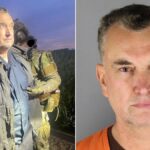WASHINGTON — Days after a Minnesota state lawmaker was killed and another injured in a “politically motivated assassination,” President Donald Trump said on Tuesday that he would not call the state’s governor, eschewing a traditional presidential response to tragedies.
“Why would I call him? I could call and say, ‘Hi, how you doing?’ The guy doesn’t have a clue,” Trump said, referring to Gov. Tim Walz, D-Minn., who was the vice presidential contender facing off against Trump’s ticket in 2024. “He’s a mess. So I could be nice and call, but why waste time?”
Presidents have historically called state and local politicians on both sides of the aisle to lend their support in the aftermath of violent tragedies like natural disasters or high-profile shootings.
Walz’s office did not immediately respond to a request for comment on the president’s remarks.
Vice President JD Vance spoke with Walz after the shooting, a source close to the governor said. Walz expressed appreciation for the coordination between federal law enforcement and Minnesota public safety officials, the source said.
Former President Joe Biden also called Walz after the attack.
State Rep. Melissa Hortman and her husband were killed on Saturday at their home by a gunman impersonating a police officer. State Sen. John Hoffman and his wife also were shot at home and were severely injured.
The suspect, 57-year-old Vance Boelter, was captured Sunday night after a high-stakes manhunt. Brooklyn Park Police Chief Mark Bruley said on Saturday that police found a “manifesto” in the suspect’s car with names of other lawmakers and officials prompting several lawmakers to beef up security. An official who saw the list said it targeted prominent Minnesotans who advocate for abortion rights.
The shootings sparked renewed concerns about growing political violence. Walz has said that the killings “appeared to be a politically motivated assassination.”
Trump has previously contacted others related to violent tragedies. During his 2024 presidential campaign, he attended the wake for fallen New York police officer Jonathan Diller. Earlier this year, Trump called Gov. Josh Shapiro, D-Penn., after an arson attack at the governor’s home.
Such outreach is traditional for presidents. After then-Rep. Gabby Giffords, D-Ariz., was shot in 2011, then-President Barack Obama called Gov. Jan Brewer, a Republican, to offer “the full resources of the federal government.” Former President Joe Biden called Trump to check on his condition after last year’s assassination attempt in Butler, Pennsylvania. Former Gov. George W. Bush called then-Gov. Tim Kaine, D-Va., after more than 30 people died in the 2007 Virginia Tech mass shooting.
At the same time, Trump’s critics have argued that some of his actions condoned political violence. On his first day in office, Trump pardoned about 1,500 people charged with crimes related to the Jan. 6, 2021, attack on the U.S. Capitol. The pardon did not make an exception for people who assaulted law enforcement officers.




